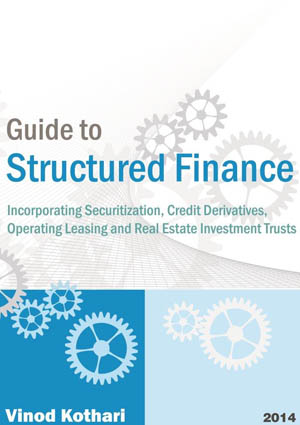Services
Securitization is the transformation of financial assets into securities. Securitization is used by financial entities to raise funding other than what is available via the traditional methods of on-balance-sheet funding.
This device that originated in the mortgage markets in the USA in 1970 and became popular in the 1980s as banks would try to take advantage of regulatory arbitrage possibilities. Regulatory arbitrage existed in that the regulatory capital requirements for securitized assets were much lesser than those in case of assets on the balance sheet. The development of accounting standards – FAS 77/ FAS 125 in the USA also greatly contributed to the development of securitization, by generally enabling off balance sheet treatment even if there were significant recourse obligations and retention of residual returns by the sellers. Thus, off balance sheet became easy way of doing banking business whereby banks will keep more assets off the balance sheet than on it.
During the period 2002-2006, securitization grew very rapidly, as subprime mortgage lending picked up. Bouyed by the low default rates with increasing housing prices, subprime lenders picked up excellent spreads, parcelled the loans in the market, and report handsome profits with limited risks. All this collapsed in 2007 as the subprime crisis set in. Several people blame securitization for the crisis – while the jury is out on this question, it is surely clear that leverage levels went to inordinate levels due to securitization.
Securitization appears to be reviving during 2012- 2013. It is apparently growing faster outside of USA than in USA lately. Securitization has now re-emerged as a refinancing instrument and is even being used by non-traditional entities such as furniture rental startups.
We provide comprehensive services on securitisation, details regarding the same can be viewed here.
Securitization Workshops And Trainings
Our Securitisation workshops covers a broad spectrum of issues including motivations, legal issues, financial structure and cost of securitisation, accounting and taxation, regulatory capital, cash-flow modeling, documentation, investing in ABS, etc. Currently, the Securitisation Master Classes also include hot topics in structured finance like Covered Bonds.
Apart from the workshops, we also organize The Securitization Summit annually. This event sees the coming together of various stakeholders from the industry.
Our Past Experience
Apart from trainings, VKC has also worked with a number of reputed organizations in the world. Some of the prestigious projects that we have handled so far has been listed below:
- Structuring of low cost housing finance mortgage securitisation – Musa Capital, Johannesburg, South Africa.
- Advising Govt. of India on security interest enforcement laws, including mortgage laws – Tanmeyah Micro-enterprise Services.
- We are currently retained by National Housing Bank for promoting Covered Bonds in India.
- We were a part of a Working Committee formed by National Housing Bank to suggest measures for exploring capital market instruments in India and alternative instruments like Covered Bonds. We were instrumental in bringing the draft of the Covered Bonds regulation in India as well.
- We have recently acted as consultants for a Sri Lankan company on securitizing their pawn receivables. We have been engaged from structuring of the transaction to getting it through rating agencies and several other intermediaries involved.
- We have been a retainer to one of the rating agencies (CARE) in India. During our retainership, we have advised the client on their rating methodology, specific structured finance ratings proposals. The rating agency has rated several transactions of housing loan receivables too.
- Vinod Kothari has been on an Asian Development Bank consulting group to advise the Government of India on securitisation and enforcement of security interest laws in India. The group is responsible for suggesting comprehensive amendments to the SARFAESI Act in India to make securitisation and security enforcement laws effectively work in the country.
- Providing comprehensive consulting on securitisation of consumer finance receivables to Moccis, a company based in Malaysia. We adopted a hand holding approach to their securitisation effort including basic guidance, advising on the financial economics, structuring of their proposed securitisation, etc.
- Assisting the South African Revenue Service (income-tax department of South Africa) in preparation of a taxation manual for securitisation and synthetic securitisation transactions. We prepared a detailed guideline on securitisation and assisted them to prepare a taxation scheme to ensure tax neutral and yet robust taxation environment.
- Year-long retainership with Citibank for their securitisation activities in the country. During this term, we advised the bank on several securitisation transactions where Citibank was the structurer/investment banker.
- Advising Cognizant Technologies, IT Company headquartered in the USA, on structuring and modeling of residential mortgage backed transactions. Cognizant engaged us for a 6-month consulting contract for the modeling project that they envisaged for leading US banks (such as Deutche, Washington Mutual). This project required us to prepare detailed Excel models for real life securitisation transactions, primarily of residential mortgages, from the US market.
- Advising Infosys Technologies, a leading IT company, to set up the functional requirements for a securitisation module to be added to their software products. This assignment required us to take the company step by step through securitisation procedures and prepare cashflow models for various types of securitisation transactions.
- Advising GE Capital, a leading finance house, on several of their securitisation transactions. We have been engaged to vet and vouch information memoranda for securitisation transactions, check essential financial data, and advise the company on taxation and accounting requirements.
Securitisation Glossary
Articles On Securitisation
News on securitisation
Credit Derivatives
Services
Credit derivatives, an instrument that emerged around 1993-94, is a part of the market for financial derivatives. Since credit derivatives are presently not traded on any of the organised exchanges, they are a part of the over-the-counter (OTC) derivatives market. Though still a relatively small part of the huge market for OTC derivatives, credit derivatives are growing faster than any other OTC derivative, the reasons for which are not difficult to understand.
Credit derivatives are derivative contracts that seek to transfer defined credit risks in a credit product or bunch of credit products to the counterparty to the derivative contract. The counterparty to the derivative contract could either be a market participant, or could be the capital market through the process of securitisation. The credit product might either be exposure inherent in a credit asset such as a loan, or might be generic credit risk such as bankruptcy risk of an entity. As the risks, and rewards commensurate with the risks, are transferred to the counterparty, the counterparty assumes the position of a virtual or synthetic holder of the credit asset.
Our Training Experience
As trainers on specialized financial subjects such as affordable housing finance, housing microfinance, securitisation, mortgage lending, derivatives, credit-derivatives, structured finance, leasing, asset-backed financing, secured lending and microfinance, we have almost an immaculate position and reputation.
- We have conducted training courses in ALL the continents of the world.
- We have conducted training courses in most of the world’s leading financial centers. The list includes New York, Washington, London, Milan, Frankfurt, Luxembourg, Dubai, Singapore, Hong Kong, Johannesburg, Cape Town, Mumbai, Delhi, Kolkata, Bangalore, Chennai, Jakarta, Cairo, Amman, Istanbul, Sydney, Kuala Lumpur, Colombo, Colombia, Dhaka, etc.
- We have conducted training courses for diverse groups, from a group of investors in Sydney, to a rating agency in Kuala Lumpur, to a group of lawyers in Mumbai, to a group of quants in New York, to insurance professionals in Milan, to a multilateral investing bank in Luxembourg.
- In most cases, our trainings have been rated “excellent”.
- We conduct a 7 days residential training course in Kolkata, India. We do several runs of this every year – we have completed 10 runs already. This training course attracts participants from all over the world.
Our Past Experience
- We have had a yearlong continuing project-related training assignment with Royal Bank of Scotland’s India Development Center. This requires us to study their credit derivatives trading/risk management systems, and build a training package around the same.
- We have advised on several occasions on valuation of derivatives transactions done by entities.
- We have advised on legality of certain foreign exchange derivatives transactions entered into by a company with a bank – from the viewpoint of whether the transaction was conducted as a hedge.
Covered Bonds
Services
Covered Bonds
Covered bonds, a hybrid between asset-backed securities/mortgage backed securities and normal secured corporate bonds, are an instrument of refinancing, primarily used by mortgage lenders. Unlike secured corporate bonds which provide recourse against the issuer, covered bonds provide a dual recourse – that is, first recourse against the issuer, and bankruptcy-protected recourse against the assets of the issuer (Cover Pool) too. Covered bonds are expected to provide a rating upliftment, over and above the rating of the issuer.
Covered bonds have existed in Europe for over 200 years. Until recent years, covered bonds have essentially been a Continental European instrument, known by variety of names such as pfandbriefe in Germany, realkreditobligationer in Denmark, obligations fonciers in France, pantbrev in Spain, etc. However, the sub-prime crisis and the associated aversion for mortgage backed securities gave a new wave of popularity to covered bonds, spreading it to many new destinations such as USA, Australia, New Zealand, Canada, Korea, and Malaysia and so on. The Asian market for covered bonds seems to be looking up with Singapore banks taking covered bonds with aplomb.
Vinod Kothari Consultants in the field of Covered Bonds
Vinod Kothari Consultants is a premiere training agency which offers at least 20 training course on Credit Risk, securitization and credit derivatives all over the world, of which faculty for most of them is Mr. Vinod Kothari himself. The locations VK has offered seminars/ workshops on advanced topics in finance include New York, Washington DC, London, Milan, Frankfurt, Luxembourg, Sydney, Singapore, Hong Kong, Kuala Lumpur, Johannesburg, Mumbai, Delhi, Kolkata, Shanghai, Shenzhen, Colombo, Colombia (South America), Dubai, Kuwait, Dhaka, Zambia, Jordan, Egypt, Indonesia, Nigeria, etc.
We will be glad to structure training on covered bonds on public/private basis.
Miscellaneous
- S&P’s News Report on Prospects of Covered Bonds Market in India, 12th September, 2017
- Need for Covered Bonds in Indian Housig Finance Sector, 9th December, 2014
- European Covered Bonds Council
- UK Regulated Covered Bonds Council
- Financial Services Authority, UK, on Regulated Covered Bonds
- Fitch Ratings Covered Bonds Rating Methodology
- S&P’s Covered Bonds Rating Methodology: Clarification of Liquidity Need Calculation, March, 2009
- Deutsche Bank, Global Markets Research, Overview of Covered Bonds, Feb 2009
- Covered Bonds in Asia, Asian Bond Market Forum
Our Past Experience
Apart from trainings, Vinod Kothari Consultants has also worked with a number of reputed organizations in the world. Some of the prestigious projects that we have handled so far has been listed below:
- We are currently retained by National Housing Bank for promoting Covered Bonds in India.
- We were a part of a Working Committee formed by National Housing Bank to suggest measures for exploring capital market instruments in India and alternative instruments like Covered Bonds. We were instrumental in bringing the draft of the Covered Bonds regulation in India as well.
- We are hopeful of launching the first covered bond issue in India soon.
Articles On Covered Bonds
Asset Recostruction / SARFAESI
Services
he word “asset reconstruction company”
The word asset reconstruction company is a typical Indian word – the global equivalent of which is asset management companies. The word “asset reconstruction” in India owes its origin to Narsimham I which envisaged the setting up of a central Asset Reconstruction Fund with money contributed by the Central Government, which was to be used by banks to shore up their balance sheets to clean up their non-performing loans. This idea never worked: so Narsimham II thought of asset reconstruction companies, the likes of which had already been successful in Malaysia, Korea and several other countries in the World. To keep the tune the same as the original idea of asset reconstruction fund, as also to give an impression that ARCs are not merely concerned with realisation of bad loans but they are going to do “reconstruction”, that is, try and resurrect bad loans into good ones, the word ARC has been used in India.
Would the ARCs to any “reconstruction” or merely realisation?
On the face of it, it is difficult to see the ARCs doing substantially more than mere realisation of bad loans. Even the definition of the word “asset reconstruction” in the Ordinance talks of mere relisation and not reconstruction. As ARCs would anyway not have the capital to do any further funding of bad loans, it is difficult to see them doing any such “reconstruction” to qualify for that term.
Why Asset management companies or ARCs ?
Asset management companies have been set up in various countries internationally as an answer to the global problem of bad loans.
Bad loans are essentially of two types: bad loans generated out of the usual banking operations or bad lending, and bad loans which emanate out of a systematic banking crisis.
It is in the latter case that banking regulators or governments try to bail out the banking system of a systematic accumulation of bad loans which acts as a drag on their liquidity, balance sheets and generally the health of banking. So, the idea of AMCs or ARCs is not to bail out banks, but to bail out the banking system itself.
There are essentially two approaches to taking care of these systematic bail out efforts: one, leave the banks to manage their own bad loans by giving them incentives, legislative powers, or special accounting or fiscal advantages. The second approach is to do the same thing on a concerted, central level, through a centralised agency or agencies.
The former approach is called the decentralised approach and the latter approach is called centralised approach. AMCs arise out of the second approach – that is, a centralised agency for resolving bad loans created out of a systematic crisis.
Each approach has its own advantages and disadvantages and there is no clear evidence of any of the two being better over the other. Various countries have tried either of the two approaches with success stories and failures in either case.
What are the advantages of an AMC approach ?
- Centralisation of bad loans in one or a few hands and therefore obviously more clout
- It is possible to give special legislative powers to a few AMCs rather than to each bank
- Banks are left with cleaner balance sheets and do not have to deal with problem clients. Regular banking relations with the group are not affected.
- Because it deals with a larger portfolio, it can mix up good assets with bad ones and make a sale which is palatable to buyers.
- It is easier to do a capital-market based funding for an AMC than for the banks themselves.










